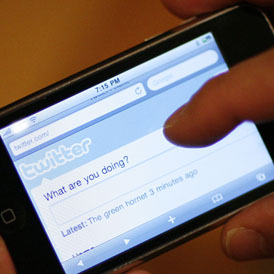Twitter legal row as footballer sues over super-injunction
Media lawyer Mark Stephens tells Channel 4 News the originator of Twitter rumours which breach an injunction “will be traced” as a tech expert says the social media site itself should not be blamed.
A legal row that could threaten the future of social media websites has broken out after it emerged that a high-profile footballer is suing Twitter over the breach of a super-injunction.
The player is taking action after Twitter users claimed to have identified a player who allegedly had an affair with Imogen Thomas, a former contestant on Big Brother. Referred to as “CTB” in court documents, the sportsman is said to have had a “sexual relationship” with Ms Thomas.
The player, who had obtained an order preventing his name being revealed by the media, is suing both Twitter and “persons unknown”.
Media lawyer Mark Stephens, who is is not woking on the case, has told Channel 4 News he believes the football star is now in a “catch-22 situation”.

Mr Stephens said: “He is trying to bring proceedings for contempt of court in London and he’s trying to work out who he should bring them against.
“If he is successful – and he should be – the individual [who first named the player] should be fined or go to jail.
“But the insurmountable challenge is that in order to obtain the information from Twitter, who are in the US, he won’t be able to protect his anonymity. It is a catch-22 situation”.
Mr Stephens compared the case to the Spycatcher row in the 1980s. The Goverment banned the book, which was written by a former MI5 officer. But it was available overseas and imported into the UK.
He added: “I think the footballer will be identified this week and I do believe the originator [of the tweet] can be traced.”
What now for Twitter?
Matt Brian, from technology website The Next Web, told Channel 4 News this is an unusual situation for Twitter.
He said: “Twitter has successfully avoided being drawn into lawsuits, mainly because it is a service that facilitates and encourages free speech, albeit in a digital form.
“Twitter records the email address, the IP addresses and locations of users as a matter of protocol (and to ensure it can co-operate with the authorities should it be required to).
“I imagine it wouldn’t be too difficult for Twitter to collate this information and pass it on. However, the company has yet to set up operations in the UK, so it is not necessarily obliged to cooperate with requests from authorities in this country.”
Twitter provided the means, it didn’t take any part in reinforcing the messages. Matt Brian
He insisted Twitter should not be forced to remove posts.
“Not only would it be impossible to police but it goes against Twitter’s ethos.
“Twitter has played an important part in the overthrowing of governments and galvanising relief efforts in disaster areas such as Japan. Censoring tweets is not the key, Twitter is just the platform for the message.
“Users who incite hatred or post illegal content should be pursued individually, penalising the company that hosts the messages doesn’t make any sense.
He added: “Suing Twitter could be likened to suing a mobile operator for allowing people to message/text each other the same messages.
“Strictly speaking the poster of the messages did break the law. Twitter provided the means, but it didn’t take any part in reinforcing the messages.”
But lawyers at Schillings, which is representing “CTB”, said the footballer’s action did not amount to suing Twitter.
A Twitter spokesman said: “We are unable to comment.”
'Social media isn't the wild west, it's the way forward'
Anna Doble, a legal director at media law firm Wiggin, specialising in privacy issues, writes:
It's not helpful to see Twitter or the web demonised, as it seemed to be by the comments of Lord Neuberger on Friday. Social media isn't the wild west, it's the way forward.
The way people communicate and receive news has changed. There has to be a realisation that everyone can and will comment on issues of public interest, and the legal system has to modernise to deal with it. The naming of the footballer by someone on Twitter is perhaps a symptom of the frustration that is felt about the way in which privacy has been handled in the courts.
I think most people would agree that it's important for society for court orders to be adhered to, but, rightly or wrongly, if there is a feeling that power or wealth is being used to censor the media, and bad law is being made, the reaction is understandable.